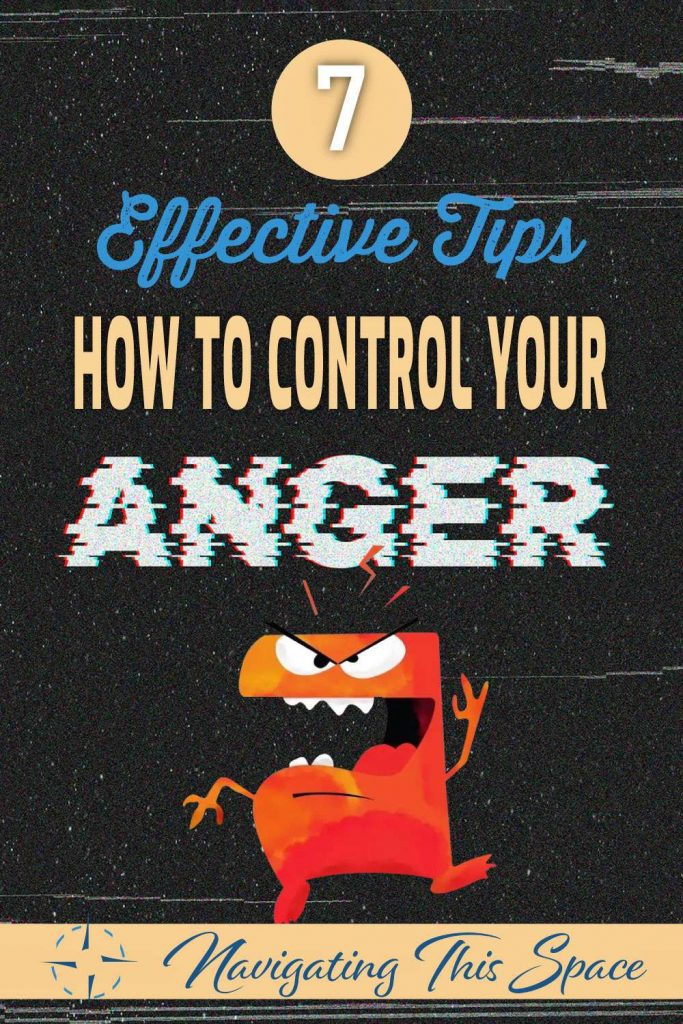It is natural to feel angry when things don’t go your way. But have you ever stopped to think about how this anger could be affecting your life?
You might not notice its effects on your productivity, relationships, physical well-being, and emotional state.
This blog post will help you identify what triggers anger in the first place, ways that you can deal with it, and effective techniques on how to control your anger by channeling that energy into something more productive!
- What Is Anger?
- Getting to the Root of Anger
- 7 Effective Tips on How to Control Your Anger:
- Be Mindful of Your Thoughts and Feelings.
- Questions You May Have
What Is Anger?
Anger is a natural emotion.
It’s a strong feeling of annoyance, displeasure, or hostility. — Oxford Dictionary
It can be beneficial to let us know when we are being wronged or threatened. But anger can also cause problems for the person exuding the anger and those around them.
It’s quite normal to express your anger, but the way you express that anger is what can make or break your relationships, both professional and personal.
So, how do you express anger in a way that is healthy and helps the situation?
It’s easier said than done, but the gist is to know where to draw the line!
In other words, get really good at anger management.
Getting to the Root of Anger
First things first. It is important for you to understand what exactly triggers your anger before you can learn effective ways to manage your anger.
A key point about anger is that everyone expresses it differently. So instead of looking for a universal answer to what triggers your anger, start paying attention to situations that stir your anger and analyze why you’re reacting with anger.
If you’re not sure where to start looking, here are a few common scenarios that may trigger your angry feelings:
– Someone breaking your trust
– A person who constantly fails to uphold their end of a bargain
– A situation that makes you feel powerless or trapped
– Feeling disrespected by someone, whether it is intentional or not
– Being criticized by someone who refuses to help
– Being purposefully ignored by a family or friend when you need their help the most
The list goes on and becomes more specific to your own situation.
That’s why you need to start noticing what happens before your anger kicks in.
It can be easy to pinpoint the cause of our fury. However, it doesn’t mean we always know the reason for feeling angry, especially if no one is around us when these feelings arise.
If you’re looking for a more accurate assessment of yourself, here are some questions to ask yourself in your journal:
– How do I feel? Sad? Frustrated? Ashamed or embarrassed? Angry at myself or someone else? Annoyed with others’ behavior toward me (e.g., rude, inconsiderate)? Unable to control my emotions because they get out of hand quickly and without warning?
– Am I really angry, or is this angry feeling a mask to hide other feelings like sadness, anxiety, or fear?
– Am I using anger as a defense mechanism to avoid feeling any other emotions that lead me to be vulnerable and open to others’ judgment of my actions, words, or thoughts?
Pay attention to how you answer these questions. Your anger may be masking other emotions.
7 Effective Tips on How to Control Your Anger:
1. Recognize that Anger Is a Natural Human Emotion

Anger is a normal and natural human emotion. Sometimes it’s impossible not to get angry when something bad happens to you.
The key is not to get angry at the wrong things, in the wrong way, for too long, or with the people who are innocent of infringing on your boundaries or hurting your feelings.
So it’s important that you learn how to recognize anger when it arises and start feeling okay about having this emotion instead of trying to suppress it completely.
If you’re the type of person who chooses to bottle up all your emotions and keep them inside without expressing how you feel, one day you’ll end up exploding in anger because of the pressure building up inside you.
It’s also important to develop healthy outlets for your feelings, whether through talking with someone about how you feel or writing out every detail that makes you angry.
Some good ways to “vent” are by doing some frequent exercises such as jogging or a brisk walk and yoga, which help release those pent-up emotions instead of letting them build up over time until it all explodes.
The more aware you are when your anger arises, the less likely you will explode towards others or hurt yourself out of frustration.
Don’t be scared to let out a gut-wrenching scream if you have to find healthy ways to deal with anger while never forgetting that it’s a normal emotion.
2. Identify Your Triggers
It can be helpful to keep track of what types of situations trigger your feelings of anger. If this triggers too many emotions or gets overwhelming (which often happens), simply write down two or three that stand out the most.
Start small, and when you’ve built enough control, move on to another trigger.
From there, try writing them all out in your journal until you can identify common themes between each one.
Once you know what these triggers are, make an effort every day to understand and avoid those specific thoughts/situations as much as possible!
Knowing the warning signs can help de-escalate any situation before it becomes out of hand.
Understand that if your anger turns physical then it’s time to talk to a mental health professional to work on ways to keep your anger under control.
3. Use Deep Breathing Exercises to Calm Yourself Down
Another way to avoid getting angry is by doing deep breathing exercises.
Deep breathing relaxes your mind and body, preventing you from exploding on strangers or lashing out in rage at someone who didn’t deserve it.
If possible, make sure that when you do these types of exercises, no one is present to cause a distraction. The distraction may cause a bigger explosion, so be mindful of your surroundings and the people present.
When you take a moment to implement this relaxation technique, you’re giving yourself time to calm down and think before you act.
If done effectively, this can prevent anger from reaching its peak where it would be most destructive.
Simple Breathing Exercise
Here’s a simple breathing exercise you can utilize anywhere or anytime to control anger:
– Close your eyes
– Take a deep breath while counting one to four through your nose
– Hold your breath and count to four
– Then, exhale through your mouth for another four counts
Repeat this exercise as many times as you need until your body starts to feel relaxed and your temper has dissolved.
Feel free to create your own breathing exercises if the one above doesn’t work for you! If you need to count to ten instead of four, do it. Try different ways until something works.
4. Talk It Out With Someone You Trust
When your heart rate starts escalating, and your relaxation techniques aren’t working, having someone to talk to could be the solution you need to relax.
If you’re an introvert like me, talking about your feelings can be really difficult.
When I’m angry at someone else, it’s sometimes easier to just ignore that person forever rather than confronting them or telling anyone how I feel on the matter. Note: This is something I’m actively working on.
After all, there are only so many people who will genuinely listen and even fewer who won’t pass judgment. That is why choosing the right person to confide with is essential.
Choosing a close friend, family member, or therapist you trust completely can help ease some of those negative, angry feelings by simply talking everything out.
Remember, not everyone is going to listen even if they say they will. Find someone who genuinely cares for you and keeps you honest.
5. Be Assertive, Not Aggressive
If someone triggers your anger, be assertive and speak up. Let them know how their actions have affected you instead of lashing out and being aggressive.
This will educate them on what they did wrong and how you feel about it.
Remember, if someone triggers your anger, that means something is important enough for you to get angry. Don’t ignore those feelings. Address them and analyze them, so you can understand them.
You have every right to be upset by dreadful things other people say or do. But remember to think before taking action because once those emotions have been released, they can never be taken back.
Being assertive rather than aggressive shows self-control and maturity. It is a way to take back the power that other people have robbed from you by their inconsiderate words or actions, which in turn makes you feel more in control of yourself and your life.
When you’re able to do this, you stop being reactive and become proactive. You control your own behavior rather than being controlled by people who don’t deserve your time, energy, or attention.
To manage anger, choose to be assertive instead of aggressive when people try to trigger a negative response or hurt you in any way.
If done correctly, this will make you feel better, more empowered, and confident about yourself!
6. Keep in Mind That It’s Okay to be Angry but It’s Not Okay to Hurt Someone or Destroy Something
Anger can be very destructive if it’s not managed correctly, and it can lead to severe consequences if you don’t control your temper.
If something is angering you, remind yourself that while it’s okay to feel angry about the situation, hurting someone and/or destroying things isn’t going to solve anything.
Try breathing exercises, briskly walk away, or slowly start counting to one hundred before acting out on those negative feelings. Think before you speak or act; otherwise, you’ll end up destroying great professional or personal relationships.
Take a step back and analyze why you’re feeling the way you are so that instead of reacting negatively, which will only make matters worse, you can find a positive solution to fix the problem at hand.
Seek professional help from a certified doctor if your anger is and continues to be destructive.
Forget about being judged for speaking to a therapist. Instead, understand that you’ll be doing yourself and those around you a huge favor by addressing your anger problems and taking anger management classes instead of continuing on your destructive path.
Follow all medical advice that is given to you by your medical professional.
You’re not the only one dealing with anger issues. More than likely, they’ve seen and dealt with it many times before.
7. Find a Hobby or Activity That Will Help Release Some of the Tension From Being Angry
Your physical health may be affected by anger as well.
If you’re feeling anxious, upset, or on edge, then your body may be experiencing stress that’s harmful to both your mental and physical health.
When this happens, the best thing for you to do is find a hobby or activity that will help release some of those negative emotions before they destroy everything in their path, including relationships with family members, friends, co-workers, and everyone you come into contact with.
Try something relaxing like meditation or yoga, go for a run, try boxing or jiujitsu. Try anything that releases tension in your body.
Be Mindful of Your Thoughts and Feelings.
Don’t allow anger to control how you live your life because it will only make things worse for yourself and those around you!
Feeling angry is not something you should be ashamed of. We all get angry. How we act during our angry moments is what matters most.
Focus on your thoughts and get to the root of why you’re feeling anger. Practice anger management skills and learn different strategies to keep yourself in control.
Anger is the easiest emotion to feel. Learn to move beyond your anger and get to the reason why your anger was triggered.
How do you deal with anger?
Questions You May Have
Is anger a mental illness?
Anger is not a mental illness. It’s a basic human emotion like happiness, sadness, or fear. Anger is a feeling that signifies something unpleasant has occurred and needs to be dealt with. How you go about dealing with that particular situation is what will determine whether you have control over your anger or not.
How anger affects your brain and body?
Like any other emotion, anger is processed in the brain. When you feel angry, your heart pumps faster while your blood vessels constrict, causing tension in the body. It is also common to experience dry mouth and clenched teeth.
Is anger a good or bad thing?
Anger is neither a good nor a bad thing. It is a basic human emotion. How you react and express your anger will determine whether it is good or bad. The key to learning how to control your anger is simply by learning how to control your reactions and impulses in any given situation






Great post Jody! I think a lot of people struggle with outbursts here and there even the calmest of us and identifying triggers is a key starting point! For me, if I’m hungry leave me alone because I’m hangry haha I made sure to tell my friends to avoid the situation!
Thanks Nelly, I am the same!! I’m a whole monster when I’m hungry lol